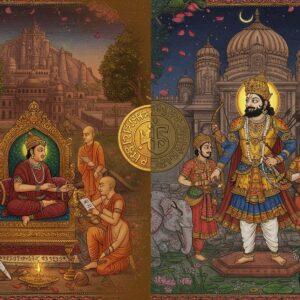Mīmāṃsā: Ancient Indian Philosophy for Modern Living

Mīmāṃsā, a profound branch of Indian philosophy, shapes our understanding of rituals and duties. Its influence transcends ancient times, impacting various aspects of modern life. For those who cherish tradition and appreciate the ease of online shopping for ritual items, understanding Mīmāṃsā can enrich cultural appreciation and practice. Explore Poojn.in’s collection of puja samagri to support your practice.
Understanding Mīmāṃsā
Mīmāṃsā is one of the six orthodox schools of Hindu philosophy. It emphasizes rituals and dharma, primarily focusing on the Pūrva Mīmāṃsā Sūtras by Jaimini. Commentaries by Śabara, Kumārila Bhaṭṭa, and Prabhākara illuminate these texts. Mīmāṃsā provides guidance on performing rituals by delving into their philosophical foundations.
- Apūrva: This unseen force, generated by rituals, underscores the practical impact of actions in Mīmāṃsā. It suggests that rituals create a specific energy that influences outcomes.
- Atheistic Stance: Unlike Vedānta, Mīmāṃsā prioritizes the power of rituals themselves, rather than the intervention of deities. This perspective highlights the agency of human action in sacred practices.
Mīmāṃsā’s unique approach to Vedic text interpretation provides a framework for understanding duties without relying on divine intervention.
Mīmāṃsā in Modern Legal Systems
Mīmāṃsā principles continue to guide Indian legal thought, offering a distinct method of textual interpretation. Like a discerning judge, Mīmāṃsā analyzes words and sentences to uncover their true meaning. This approach resolves legal ambiguities, making it a valuable tool in courts. For instance, Mīmāṃsā logic assists in interpreting contracts by focusing on the intention behind actions and words. Legal terms like ‘arthavāda’ (explanatory statements) and ‘vidhi’ (injunctions) originate from Mīmāṃsā. These principles aid in understanding laws, much like deciphering a complex puzzle.
By applying Mīmāṃsā, judges ensure that justice aligns with both the letter and the spirit of the law. This philosophical framework provides a robust foundation for legal interpretation in contemporary India.
Mīmāṃsā and Contemporary Thought
Mīmāṃsā extends beyond ancient rituals to inform modern ethics. Its emphasis on ‘dharma’ or duty influences contemporary moral philosophy. By prioritizing duty-based ethics, Mīmāṃsā provides a framework for ethical living. This influence extends to modern ritual practices, shaping cultural identity for many Indians.
Mīmāṃsā also offers insights into the philosophy of language, providing perspectives on meaning and sentence structure. This aligns with contemporary linguistic studies. The precision required in rituals mirrors the accuracy of scientific methods, bridging tradition and modernity.
Discover how Hindu philosophy connects with modern life.
Mīmāṃsā Training and Education
Traditional Mīmāṃsā education thrived in gurukuls, where oral traditions transmitted knowledge across generations. Today, modern curricula incorporate Mīmāṃsā studies in India and abroad. Learning Sanskrit remains essential for a comprehensive understanding of its texts.
Online platforms play a vital role in disseminating Mīmāṃsā teachings. They offer convenience, particularly for those balancing tradition with modern life. While the digital age presents challenges, it also expands access to these ancient teachings.
Cultural Impact and Preservation of Mīmāṃsā
Mīmāṃsā holds significant cultural importance, preserving Indian heritage and rituals. Efforts to digitize texts ensure their longevity. This philosophy permeates Indian arts, literature, and cultural practices, reflecting its timeless wisdom.
As globalization transforms cultural landscapes, Mīmāṃsā helps sustain traditional values. It cultivates a deep understanding of Indian identity and heritage. Learn more about Hindu symbols and their importance at Poojn.in.
By appreciating Mīmāṃsā, we embrace tradition while adapting to modern life.
How Poojn.in Supports Your Vedic Practice
Poojn.in empowers you to maintain authentic Mīmāṃsā traditions in the modern world. As India’s largest Dashakarma bhandar, we offer essential items for proper ritual performance according to Vedic guidelines:
- Pure copper and brass items for havan and yajna, crafted according to traditional methods.
- Traditional puja items made from approved materials, ensuring authenticity and ritual purity. Find a wide selection at https://www.poojn.in/product-category/pooja-samagri/dashakarma-items.
- Authentic darbha grass and kusha grass for rituals, sourced sustainably and ethically.
- Sacred threads and yagnopavit meeting Vedic specifications, ensuring the integrity of your rituals.
- Certified pure ghee for havan and ritual offerings, contributing to the purity and efficacy of your practices.
- Complete puja samagri kits with all required items, simplifying your ritual preparations. Explore our kits at https://www.poojn.in/product-category/pooja-samagri.
Our products adhere to Mīmāṃsā principles regarding material purity and ritual suitability. Each item comes with clear usage instructions aligned with traditional practices. We offer expert guidance through our customer service team at 91 3369029784 for questions about product selection and ritual use. Shop online with convenience while maintaining ritual authenticity. All products are securely packaged and shipped directly to your home. Regular customers can benefit from auto-delivery of frequently used items. Visit www.poojn.in or call us to discuss your specific needs. We aim to make traditional practice accessible while upholding the highest standards of ritual purity.
Embracing Mīmāṃsā: A Bridge Between Tradition and Modernity
Mīmāṃsā demonstrates the enduring power of ancient wisdom in our contemporary world. It remains relevant today by guiding legal interpretations, shaping ethical practices, and enriching cultural identity. Its principles bridge age-old traditions and modern thought.
As we explore and appreciate Mīmāṃsā, we gain a deeper understanding of our heritage. This ancient philosophy encourages us to uphold our values and embrace the beauty of traditions. Whether through legal systems, education, or cultural expressions, Mīmāṃsā continues to influence our lives. Explore further insights into the Ramayana’s relevance in modern times.
In a world often disconnected from its roots, Mīmāṃsā provides stability and wisdom. Let us carry this knowledge forward with respect and pride, ensuring its guidance for future generations.
FAQs on Mīmāṃsā and Contemporary Relevance
What is Mīmāṃsā? Mīmāṃsā is an ancient Indian philosophy centered on rituals and interpretations of the Vedas. It stresses dharma and the power of words in rituals, providing a framework for understanding Vedic practices.
How does Mīmāṃsā influence modern thought? Mīmāṃsā offers insights into ethical decision-making, the significance of rituals, and the power of language. Its focus on duty and the practical application of philosophical concepts remain relevant today.
Can Mīmāṃsā be applied in contemporary legal systems? Yes, Mīmāṃsā principles can be applied in contemporary legal systems, particularly in interpreting laws and discerning intent. Its emphasis on precise language and context is valuable in legal discourse.
Are there English translations of Mīmāṃsā texts? Yes, English translations of many Mīmāṃsā texts are available, making this ancient philosophy accessible to a wider audience. These translations help bridge the gap between ancient wisdom and modern readers.
How can one receive Mīmāṃsā training? Mīmāṃsā training is available through traditional gurukuls, universities, and online courses. These programs usually involve studying Vedic texts and exploring Mīmāṃsā principles. This allows individuals to engage with this ancient philosophy in diverse learning environments.
What is the contemporary relevance of Mīmāṃsā? Mīmāṃsā remains relevant by offering valuable insights into ethics, rituals, and the power of language. Its teachings apply to various fields, such as law, philosophy, and cultural studies. It offers a unique lens through which to examine contemporary issues.
Why is Mīmāṃsā considered important in Hindu philosophy? Mīmāṃsā is crucial because it provides a framework for understanding rituals and duties in the Vedas. It emphasizes the importance of actions and their consequences, offering a practical approach to spiritual life.


